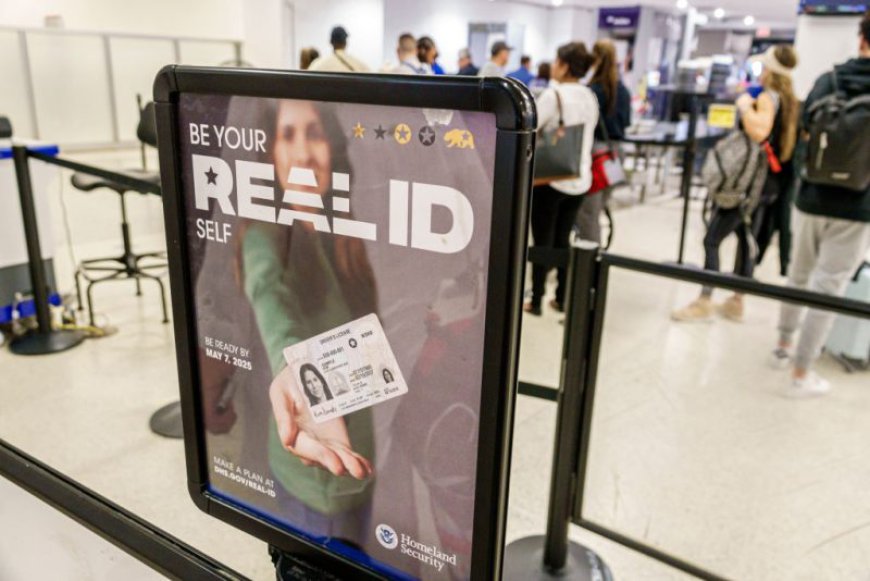Do you need a REAL ID before Wednesday's enforcement deadline? Here's what to know

(NEXSTAR) — The REAL ID enforcement deadline officially begins on Wednesday, May 7, meaning those without a compliant ID may have a more complicated time boarding flights, entering nuclear power plants and certain other federal buildings.
While the enforcement date has been delayed several times over the last few years, the impending deadline has brought lines and hours-long waits to local DMVs.
The good news is, if you don't have a domestic flight scheduled anytime soon, you likely do not have to rush to join any of those lines. And even if you do have a domestic flight in the coming weeks, you don't necessarily need a new driver's license or state ID to fly.
Here's what you need to know about the REAL ID requirement, and who may not need one right away.
You may already have a REAL ID
More than 80% of travelers already have an ID that complies with the REAL ID requirements, Homeland Security Secretary Kristi Noem told a Congressional panel on Tuesday.
Many states have been issuing compliant cards for years. If there is a star on your driver’s license or state ID card, you have a REAL ID-compliant card. The star may be black or gold, completely filled in or just the outline. Either way, you're compliant.

Some states — Minnesota, Michigan, New York, and Vermont — issue REAL ID-compliant IDs and enhanced driver’s licenses (Washington only issues the latter). State-enhanced driver’s licenses are marked with a flag rather than a star and include a chip that can make it easier to enter the U.S. by land or sea from Canada, Mexico, or the Caribbean, according to U.S. Customs and Border Patrol. REAL IDs cannot be used for crossing the borders.
Can you fly without a REAL ID?
The short answer is yes. You'll be able to use any of the alternate approved forms of identification listed below.
If you arrive at the airport without a REAL ID or another accepted form of ID, you may still be able to fly.
The TSA says that, without an ID, you may be asked by one of its officers to "complete an identity verification process." During this process, identifying information about you, like your name and address, will be collected to confirm your identity. Once confirmed, you will be allowed into the security checkpoint but "may be subject to additional screening."
"You will not be allowed to enter the security checkpoint if you choose to not provide acceptable identification, you decline to cooperate with the identity verification process, or your identity cannot be confirmed," the TSA says.
If your flight is international, you will still need a passport, plus any additional visas or travel documents, as a REAL ID does not replace or substitute a passport.
Other IDs accepted at security checkpoints
Noem noted that passports and tribal identification will be accepted in place of REAL IDs at security checkpoints on Wednesday. TSA has listed several additional forms of identification that will also get you through the checkpoints:
- U.S. passport card
- Foreign government-issued passport
- Veteran Health Identification Card
- DHS trusted traveler cards
- Department of Defense ID (including those issued to dependents)
- Permanent resident card
- Border crossing card
- HSPD-12 PIV cards
- Canadian provincial driver's license or Indian and Northern Affairs Canada card
- Transportation worker identification credential
- U.S. Citizenship and Immigration Services Employment Authorization Card (I-766)
- U.S. Merchant Mariner Credential
Children under the age of 18 do not need to provide identification while flying within the U.S.
Can you still get a REAL ID after Wednesday, May 7?
Yes, REAL IDs will still be issued even after the May 7 enforcement date.
If you are hoping to get a REAL ID, you'll want to make sure you have the necessary documentation.
At minimum, you’ll need to prove your full legal name, your date of birth, your Social Security number, two proofs of address for your principal residence, and your lawful status.
Where you don't need a REAL ID
As daunting as the deadline may sound, you will, most likely, not need a REAL ID in your day-to-day life (unless you're flying or entering certain federal facilities). REAL IDs are optional.
You do not need a REAL ID to:
- Drive
- Vote
- Buy alcohol
- Enter a post office, Social Security office, or other federal facilities that otherwise do not require an ID
- Apply for or receive federal benefits you're entitled to, like Social Security of Veterans Affairs benefits
- Receive care at hospitals
- Enter a courthouse
- Serve jury duty or participate in other law enforcement proceedings or investigations
Generally, if you are flying domestically or visiting nuclear power plants, military bases, or other sites with federal ID requirements, you may need a REAL ID. If you aren't doing any of those activities, you may not need to rush out for a new ID.
The Associated Press contributed to this report.
What's Your Reaction?
 Like
0
Like
0
 Dislike
0
Dislike
0
 Love
0
Love
0
 Funny
0
Funny
0
 Angry
0
Angry
0
 Sad
0
Sad
0
 Wow
0
Wow
0





































